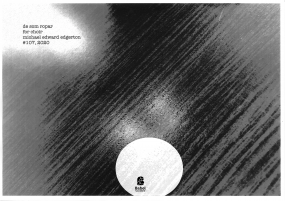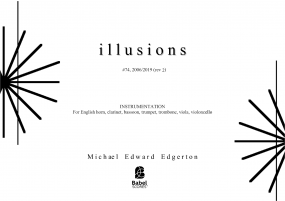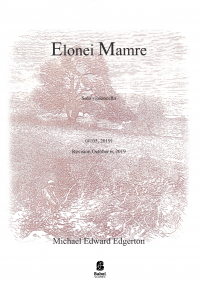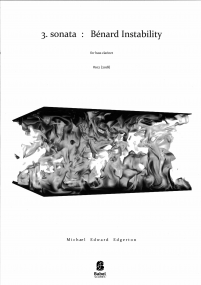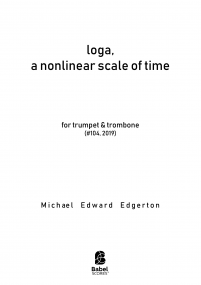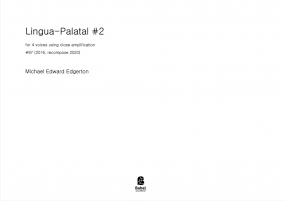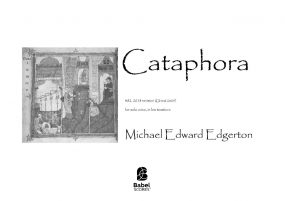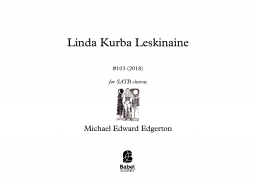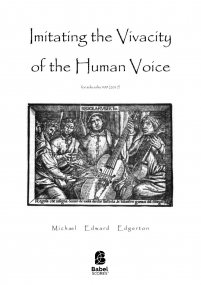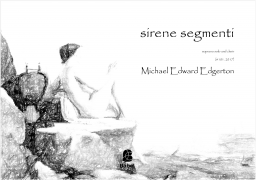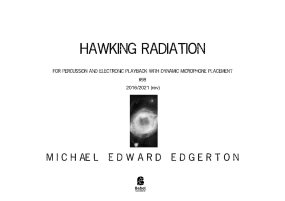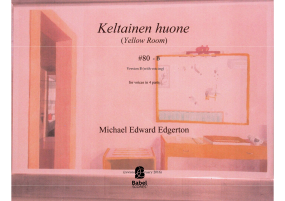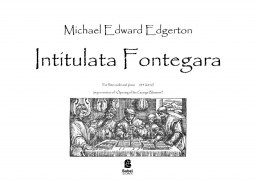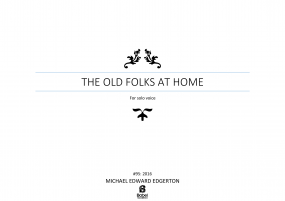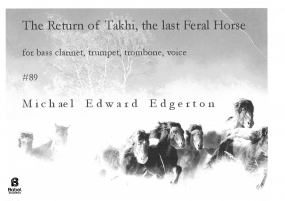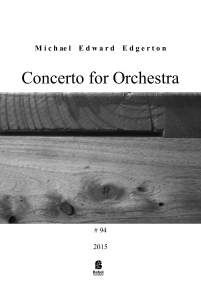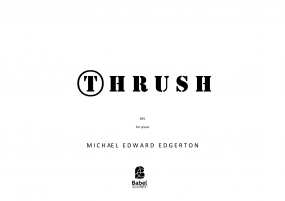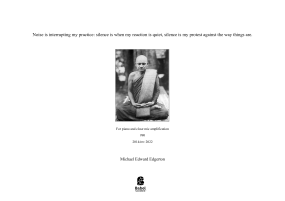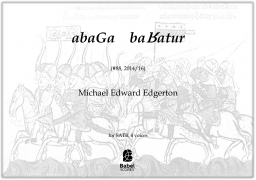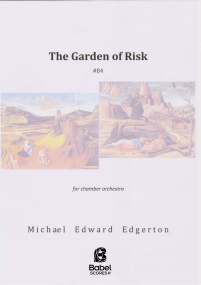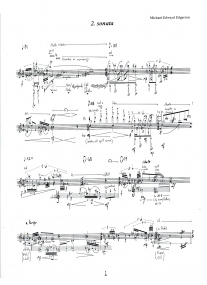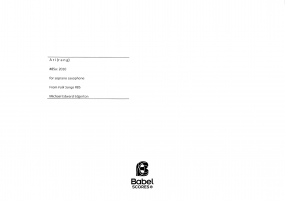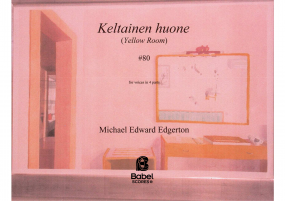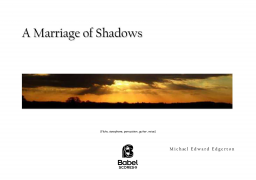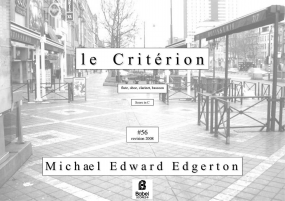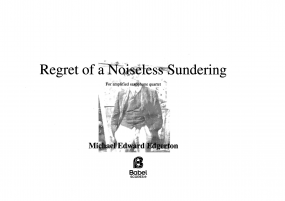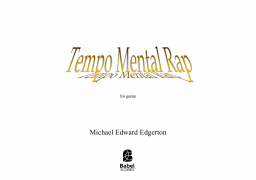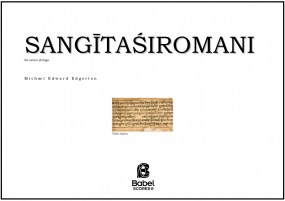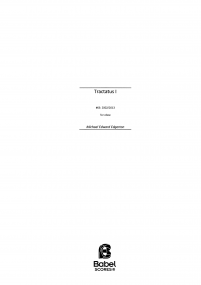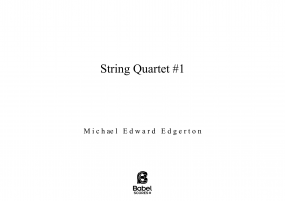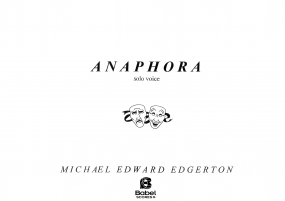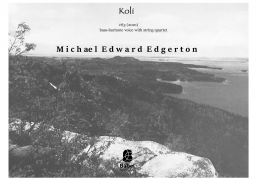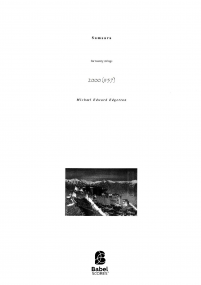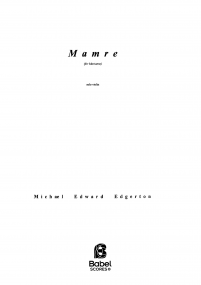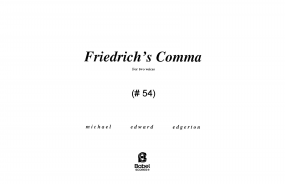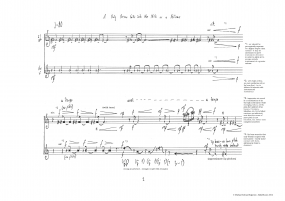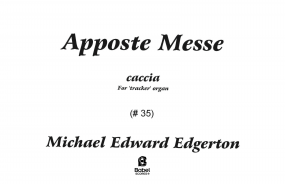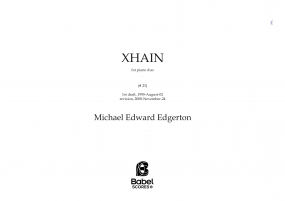
Michael Edward Edgerton
Play all audio recordingsMichael Edgerton is an active composer with performances around the world. His compositions have received international prizes and recognition including the important German award, the Kompositionspreis der Landeshauptstadt Stuttgart for his composition the Tempo Mental Rap, a series of six variations for guitar based upon a Steve Vai transcription of a Frank Zappa rap. Michael's compositions utilize a broad range of musical influences such as European avant-garde, American experimentalism, progressive rock and world music. Since the mid-90s Michael's compositions have been informed by scientific models and metaphors. Initially stemming from his studies with voice science and dynamical systems, he's built a body of work that explores the integration of nonlinear concepts applied to sound production and compositional constraints. While the methods and systems he develops are often influenced by science, it is his intuition – his ear that gives birth to the music.
Michael Edgerton is at the forefront of vocal exploration by extending the technical and expressive capabilities of voice. As composer, researcher and performer, he has presented new developments in the search for the limits of sound production. Notably, he has systematically investigated extra-normal singing using the tools of voice science and psychoacoustics. This approach has earned Mike considerable renown for those interested in the present and future of modern (experimental) voice.
Michael has received prizes for his compositions and his music has been performed around the world by ensembles and soloists.
Michael is engaged with research. In 1995, Michael was asked by Barney Childs and Philip Rehfeldt to contribute a book on modern vocal techniques to the New Instrumentation Series. Since his approach has been to focus on the mechanics of voice production, Michael applied for and received a three-year Postdoctoral Fellowship from the National Center for Voice and Speech to study voice science and participate on research projects that included: reinforced harmonics, chant, ingressive airflow phonation, vocal violence. In 2005, THE 21St CENTURY VOICE was published by Scarecrow Press, with the second edition being released ten years later with Rowman & Littlefield. The book proposes continued exploration of vocal production based within the framework of voice science. Michael has also published scholarly articles on music composition, the extra-normal voice, nonlinear phenomenon and multidimensional scaling in sound production. Michael was recognized in the “Marquis Who’s Who in the World” since 2015. His creative and scholarly outputs has significant impact as evidenced by citations in books, articles and dissertations/theses.
Olaf Katzer, Artistic Director of AUDITIVVOKAL DRESDEN has written, “Forty years after Luciano Berio’s “Sequenza” the American composer Michael Edward Edgerton has illuminated in his study “Anaphora” the expressive potential of the human voice. A kaleidoscope of 56 different categories of vocal multiphonics shows the wealth that the human carries in vocal expression. It pays to listen closely because simply there are many never heard before sound landscapes, in which multiphonic and polyphonic sound cosmos appears, although they are given by only one woman. These sounds are based neither on witchcraft, nor cast by a mystical spell, but are the result of scientifically based research in the field of voice, made by the composer himself and in his book “The 21st Century Voice”. Since the publication of his book “The 21st Century Voice” (2004), the American composer Michael Edgerton has become one of the leading experts in the search for the expressive possibilities of contemporary voice. No other composer has so systematically and unconditionally applied a compositional approach to every possibility of the human voice. “Anaphora” is at the same time a sound study, in which is presented his research on 56 different classes of vocal multiphonics, opening up a new sound universe.”
Michael holds a D.M.A. in Composition from the University of Illinois, where he studied principally with William Brooks. Beginning in June 2019, Michael began a job as Professor of Artistic Research at Lund University/The Malmö Academy of Music in Sweden.
Michael Edgerton is at the forefront of vocal exploration by extending the technical and expressive capabilities of voice. As composer, researcher and performer, he has presented new developments in the search for the limits of sound production. Notably, he has systematically investigated extra-normal singing using the tools of voice science and psychoacoustics. This approach has earned Mike considerable renown for those interested in the present and future of modern (experimental) voice.
Michael has received prizes for his compositions and his music has been performed around the world by ensembles and soloists.
Michael is engaged with research. In 1995, Michael was asked by Barney Childs and Philip Rehfeldt to contribute a book on modern vocal techniques to the New Instrumentation Series. Since his approach has been to focus on the mechanics of voice production, Michael applied for and received a three-year Postdoctoral Fellowship from the National Center for Voice and Speech to study voice science and participate on research projects that included: reinforced harmonics, chant, ingressive airflow phonation, vocal violence. In 2005, THE 21St CENTURY VOICE was published by Scarecrow Press, with the second edition being released ten years later with Rowman & Littlefield. The book proposes continued exploration of vocal production based within the framework of voice science. Michael has also published scholarly articles on music composition, the extra-normal voice, nonlinear phenomenon and multidimensional scaling in sound production. Michael was recognized in the “Marquis Who’s Who in the World” since 2015. His creative and scholarly outputs has significant impact as evidenced by citations in books, articles and dissertations/theses.
Olaf Katzer, Artistic Director of AUDITIVVOKAL DRESDEN has written, “Forty years after Luciano Berio’s “Sequenza” the American composer Michael Edward Edgerton has illuminated in his study “Anaphora” the expressive potential of the human voice. A kaleidoscope of 56 different categories of vocal multiphonics shows the wealth that the human carries in vocal expression. It pays to listen closely because simply there are many never heard before sound landscapes, in which multiphonic and polyphonic sound cosmos appears, although they are given by only one woman. These sounds are based neither on witchcraft, nor cast by a mystical spell, but are the result of scientifically based research in the field of voice, made by the composer himself and in his book “The 21st Century Voice”. Since the publication of his book “The 21st Century Voice” (2004), the American composer Michael Edgerton has become one of the leading experts in the search for the expressive possibilities of contemporary voice. No other composer has so systematically and unconditionally applied a compositional approach to every possibility of the human voice. “Anaphora” is at the same time a sound study, in which is presented his research on 56 different classes of vocal multiphonics, opening up a new sound universe.”
Michael holds a D.M.A. in Composition from the University of Illinois, where he studied principally with William Brooks. Beginning in June 2019, Michael began a job as Professor of Artistic Research at Lund University/The Malmö Academy of Music in Sweden.
Website:
Featured Pieces
#77 (2008)
12 E Instrumentation
Ordered by year. Most recent works appears first
for choir
Michael Edward Edgerton
#74 (2006/2019 2nd revision)
Michael Edward Edgerton
#105 (2019)
Michael Edward Edgerton
#102 (2019)
Michael Edward Edgerton
#104 (2019)
Michael Edward Edgerton
#97 (2016/2020 total recomposition)
Michael Edward Edgerton
#82 (2018)
Michael Edward Edgerton
#103 (2018)
Michael Edward Edgerton
#99 (2017)
Michael Edward Edgerton
#101 (2017)
Michael Edward Edgerton
#96 (2017)
Michael Edward Edgerton
#98 (2016/2021 revision)
Michael Edward Edgerton
with voicing
Michael Edward Edgerton
#93 (2016)
Michael Edward Edgerton
#95 (2016)
Michael Edward Edgerton
#89 (2014)
Michael Edward Edgerton
#94 (2015)
Michael Edward Edgerton
#91 (2015)
Michael Edward Edgerton
#90 (2014/22)
Michael Edward Edgerton
#88 (2014)
Michael Edward Edgerton
#84 (2009/2012)
Michael Edward Edgerton
#86 (2011-12)
Michael Edward Edgerton
#85.a (2010)
Michael Edward Edgerton
#80 (2008)
Michael Edward Edgerton
#77 (2008)
Michael Edward Edgerton
#56 (2000/2008)
Michael Edward Edgerton
#22 (1995)
Michael Edward Edgerton
#72 (2005)
Michael Edward Edgerton
#70 (2004)
Michael Edward Edgerton
#66 (2002)
Michael Edward Edgerton
#65 (2002/2013)
Michael Edward Edgerton
#64 (2002)
Michael Edward Edgerton
#62 (2001)
Michael Edward Edgerton
#63 (2001)
Michael Edward Edgerton
#58 (2001)
Michael Edward Edgerton
#57 (2000)
Michael Edward Edgerton
#55 (2000)
Michael Edward Edgerton
#54 (1999)
Michael Edward Edgerton
#39 (1997)
Michael Edward Edgerton
#35 (1996)
Michael Edward Edgerton
#23 (1995/2008)
Michael Edward Edgerton
Results 1 - 41 of 41
Vocal Ensemble
De som ropar for choir (2020)
Lingua Palatal #2 #97 (2016/2020 total recomposition) (2019)
Sirene Segmenti #101 (2017) (2017)
Yellow Room, version B with voicing (2016)
AbaGa baRatur #88 (2014) (2014)
Friedrich's Comma #54 (1999) (1999)
Chamber Ensemble (5 - 9 instruments)
Illusions #74 (2006/2019 2nd revision) (2019)
Beauty and Disappearance of an Unstable Orbit #96 (2017) (2017)
A Marriage of Shadows #77 (2008) (2008)
Sangitasiromani #66 (2002) (2003)
Solo Instrument
3. sonata: Bénard Instability #102 (2019) (2019)
Elonei Mamre #105 (2019) (2019)
Imitating the Vivacity of the Human Voice #99 (2017) (2017)
The Old Folks at Home #95 (2016) (2016)
Thrush #91 (2015) (2015)
Noise is interrupting my practice: silence is when my reaction is quiet, silence is my protest against the way things are. #90 (2014/22) (2014)
2. Sonata #86 (2011-12) (2011)
Ari(rang) #85.a (2010) (2010)
Tempo Mental Rap #72 (2005) (2005)
1. sonata #70 (2004) (2004)
Tractatus I #65 (2002/2013) (2002)
Mamre #55 (2000) (2000)
Apposte Messe #35 (1996) (1996)
Chamber Group ( 2 - 4 instruments )
Loga, a nonlinear scale of time #104 (2019) (2019)
The Return of Takhi, the last Feral Horse #89 (2014) (2016)
Intitulata Fontegara #93 (2016) (2016)
Le Critérion #56 (2000/2008) (2008)
Regret of a Noiseless Sundering #22 (1995) (2006)
String Quartet #1 #64 (2002) (2002)
A Holy Person Falls into the Nile as a Pelican #39 (1997) (1996)
XHAIN #23 (1995/2008) (1995)
Choral Ensemble
Linda Kurba Leskinaine #103 (2018) (2018)
Keltainen huone (Yellow Room) #80 (2008) (2008)
Kalevi Matus #58 (2001) (2000)
Instruments and Electronics
Beauty and Disappearance of an Unstable Orbit #96 (2017) (2017)
Hawking Radiation #98 (2016/2021 revision) (2016)
Soloist (Instrument or Voice) and Fixed Electronic Media
Hawking Radiation #98 (2016/2021 revision) (2016)
1. sonata #70 (2004) (2004)
2. Sonata #86 (2011-12) (2011)
3. sonata: Bénard Instability #102 (2019) (2019)
A Holy Person Falls into the Nile as a Pelican #39 (1997) (1996)
A Marriage of Shadows #77 (2008) (2008)
AbaGa baRatur #88 (2014) (2014)
Anaphora #62 (2001) (2001)
Apposte Messe #35 (1996) (1996)
Ari(rang) #85.a (2010) (2010)
Beauty and Disappearance of an Unstable Orbit #96 (2017) (2017)
Cataphora: lulus brevicum #82 (2018) (2018)
Concerto for Orchestra #94 (2015) (2015)
De som ropar for choir (2020)
Elonei Mamre #105 (2019) (2019)
Friedrich's Comma #54 (1999) (1999)
Hawking Radiation #98 (2016/2021 revision) (2016)
Illusions #74 (2006/2019 2nd revision) (2019)
Imitating the Vivacity of the Human Voice #99 (2017) (2017)
Intitulata Fontegara #93 (2016) (2016)
Kalevi Matus #58 (2001) (2000)
Keltainen huone (Yellow Room) #80 (2008) (2008)
Koli #63 (2001) (2001)
Le Critérion #56 (2000/2008) (2008)
Linda Kurba Leskinaine #103 (2018) (2018)
Lingua Palatal #2 #97 (2016/2020 total recomposition) (2019)
Loga, a nonlinear scale of time #104 (2019) (2019)
Mamre #55 (2000) (2000)
Noise is interrupting my practice: silence is when my reaction is quiet, silence is my protest against the way things are. #90 (2014/22) (2014)
Regret of a Noiseless Sundering #22 (1995) (2006)
Samsara #57 (2000) (2000)
Sangitasiromani #66 (2002) (2003)
Sirene Segmenti #101 (2017) (2017)
String Quartet #1 #64 (2002) (2002)
Tempo Mental Rap #72 (2005) (2005)
The Old Folks at Home #95 (2016) (2016)
The Return of Takhi, the last Feral Horse #89 (2014) (2016)
Thrush #91 (2015) (2015)
Tractatus I #65 (2002/2013) (2002)
Un jardin épineux (aka. The Garden of Risk) #84 (2009/2012) (2012)
XHAIN #23 (1995/2008) (1995)
Yellow Room, version B with voicing (2016)
2. Sonata #86 (2011-12) (2011)
3. sonata: Bénard Instability #102 (2019) (2019)
A Holy Person Falls into the Nile as a Pelican #39 (1997) (1996)
A Marriage of Shadows #77 (2008) (2008)
AbaGa baRatur #88 (2014) (2014)
Anaphora #62 (2001) (2001)
Apposte Messe #35 (1996) (1996)
Ari(rang) #85.a (2010) (2010)
Beauty and Disappearance of an Unstable Orbit #96 (2017) (2017)
Cataphora: lulus brevicum #82 (2018) (2018)
Concerto for Orchestra #94 (2015) (2015)
De som ropar for choir (2020)
Elonei Mamre #105 (2019) (2019)
Friedrich's Comma #54 (1999) (1999)
Hawking Radiation #98 (2016/2021 revision) (2016)
Illusions #74 (2006/2019 2nd revision) (2019)
Imitating the Vivacity of the Human Voice #99 (2017) (2017)
Intitulata Fontegara #93 (2016) (2016)
Kalevi Matus #58 (2001) (2000)
Keltainen huone (Yellow Room) #80 (2008) (2008)
Koli #63 (2001) (2001)
Le Critérion #56 (2000/2008) (2008)
Linda Kurba Leskinaine #103 (2018) (2018)
Lingua Palatal #2 #97 (2016/2020 total recomposition) (2019)
Loga, a nonlinear scale of time #104 (2019) (2019)
Mamre #55 (2000) (2000)
Noise is interrupting my practice: silence is when my reaction is quiet, silence is my protest against the way things are. #90 (2014/22) (2014)
Regret of a Noiseless Sundering #22 (1995) (2006)
Samsara #57 (2000) (2000)
Sangitasiromani #66 (2002) (2003)
Sirene Segmenti #101 (2017) (2017)
String Quartet #1 #64 (2002) (2002)
Tempo Mental Rap #72 (2005) (2005)
The Old Folks at Home #95 (2016) (2016)
The Return of Takhi, the last Feral Horse #89 (2014) (2016)
Thrush #91 (2015) (2015)
Tractatus I #65 (2002/2013) (2002)
Un jardin épineux (aka. The Garden of Risk) #84 (2009/2012) (2012)
XHAIN #23 (1995/2008) (1995)
Yellow Room, version B with voicing (2016)

